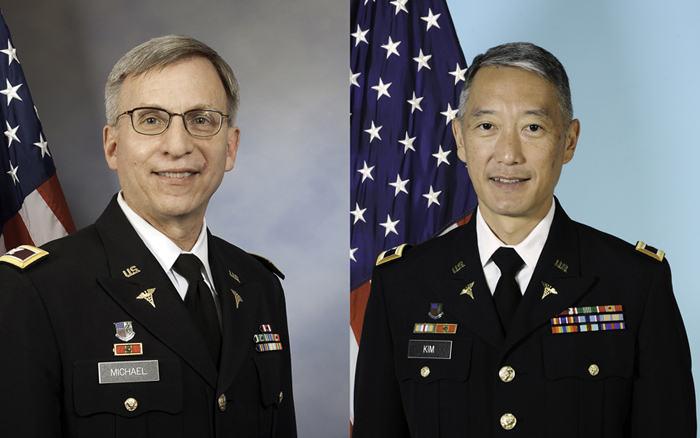2 WRAIR Researchers Named Top 50 'Most Influential People in Vaccines'

Col. Nelson Michael and Col. Jerome Kim of the Walter Reed Army Institute of Research made the list of the top 50 most influential people in vaccines for the first time. Vaccine Nation, a vaccine industry group, generates the list each year in collaboration with the World Vaccine Congress Europe.
Michael has been the director of the U.S. Military HIV Research Program at the WRAIR since January 2006, and guided the Program through the completion of the RV144 HIV prime-boost vaccine study. The clinical trial, an international collaboration involving more than 16,000 Thai volunteers, provided the world's first demonstration of the possibility of a preventive HIV vaccine.
Michael's research interests include HIV molecular pathogenesis and host genetics, HIV clinical research and HIV vaccine development. He is a professor of medicine with the Uniformed Services University. Michael currently serves on President Obama's Presidential Commission for the Study of Bioethical Issues as well as multiple scientific steering committees for the National Institutes of Health and the Office of the Global AIDS Coordinator. In 2013, he was inducted into the Association of American Physicians and was recognized as a Hero of Military Medicine.
Kim currently serves as the principal deputy of the MHRP and chief of the Department of Molecular Virology and Pathogenesis at the MHRP. He also serves as the project manager for HIV vaccines at the U.S. Army Medical Materiel Development Activity. Kim served as chief of the Department of Retrovirology at the Armed Forces Research Institute of Medical Sciences in Bangkok during the RV144 vaccine trial. As the product manager for HIV vaccines, he played a critical role in the clinical trial's execution and subsequent scientific analysis of the results.
Kim's research interests include HIV molecular epidemiology, host genetics and HIV vaccine development. He is also a professor of medicine at USU and was recently presented the Uniformed Services University of the Health Sciences John Maher Award for Research Excellence for work related to the identification of correlates of protection in HIV vaccines.
Shortly after results of RV144 were announced, the MHRP organized a vast collaborative scientific effort to analyze the results under the leadership of Michael and Kim. The MHRP and AFRIMS staff coordinated the distribution of thousands of samples from RV144 to 27 investigators around the world. In April 2012, the first paper was published in the New England Journal of Medicine detailing clues about the immune responses that may have played a role in protecting some volunteers from HIV in the RV144 HIV vaccine trial. Over 30 papers have followed, including ones in Nature, Science Translational Medicine, Immunity and The Lancet ID, providing new insights to inform future HIV vaccine development.
More recently, the MHRP, AFRIMS and USAMRMC have been working collaboratively with the Thai government to build on the success of RV144 by accelerating the development and testing of a similar pox-protein HIV vaccine prime-boost regimen in Thailand. An implementing arrangement was signed in 2014, which is part of a formal science and technology agreement between the two countries. The agreement commits the Thai government to provide capacity to manufacture the vaccine in Thailand if it is found to be efficacious in large-scale clinical testing. The Thai government issued a request for proposals for the biological production facility in August 2014.
The list of the most influential people in vaccines can be found on the
Vaccine Nation website .
.
 An official website of the United States government
An official website of the United States government
 ) or https:// means you've safely connected to the .mil website. Share sensitive information only on official, secure websites.
) or https:// means you've safely connected to the .mil website. Share sensitive information only on official, secure websites.


